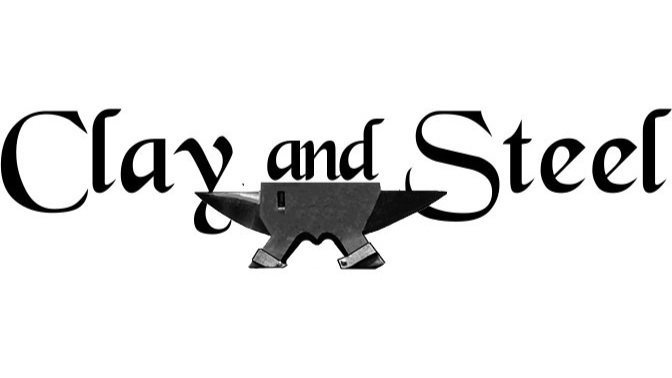
Frequently asked questions.
What is Clay and Steel?
Clay and Steel is a independently owned and operated small business. Celeste Flores, the owner has been blacksmithing for more than fifteen years. She specializes in custom metalwork in brass and bronze for homes. And she has been an instructor for twelve years. Celeste is a working artist who is passionate in training other people to fulfill their creative potential.
Clay and Steel is located within Seaport Studios. Seaport Studios is an artist run and operated organization, housing long term shop rentals for dozens of artists. It is a shared space with lots of activity, welders, wood workers, fire artists, shop cats and shop dogs all in abundance.
Can I be your apprentice?
While I do have two long term trainees, one through a California run training program and one partially trained by a fellow blacksmith, I am not taking on any new apprentices. In truth training is a hard and time consuming process. It also cost me money in terms of materials and supplies. My current trainees are young people with a long term interest in blacksmithing. One is extremely dedicated and works everyday to become a professional smith. I want to help other people succeed. But as a independent artist with a small business my time and resources are limited.
Do you teach private lessons?
Private individual lessons with independent guidance start at $90/hr. The lessons include materials. Special projects may incur additional costs based upon the needs for special tooling and/or extra preparation time.
Private group lessons are charged per person. A class for two people is $75/hr per person, three is $60/hr per person, four is $45/hr per person. Right now my class size is capped at four people. I am working on increasing capacity to five or six.
Birthday parties, bachelor/ette parties, corporate team builds, are all welcome. Quinceañera and bah/bat mitzvah’s and other youth groups require and adult present.
Can I make a sword?
With enough time and experience you can make a sword. You will need to learn the basics of forging, heat treating, grinding and handle making. You should take a class that teaches tapering, a class that teaches tool making and a class on bladesmithing to start. A newer smith with these skills can expect a sword to take around fifty hours of shop time. Or maybe thirty if you don’t care much about fit and finish.
I have experience, do I have to take a beginning class?
The beginning classes introduce you to the building, the tools and the safety requirements. All shops have different rules, so it’s important to know the rules for my particular shop. Since I learned blacksmithing at The Crucible, the safety guidelines are very similar. If you have recently taken blacksmithing at The Crucible and are confident in your tong control and knowledge of safety, I can waive taking a first time class for you. If you made a center punch in HS, or have similar experience, I would say take a first time class. Maybe make a RR Spike knife. If you have experience from other smithies contact me.
Why are you a woman?
While the majority of blacksmith are men, there are a lot of amazing women and non-binary people who excel at the craft. At local events about half the demonstrators are women. A large portion of the professional blacksmiths I know are women. There are so many amazing and creative artistic blacksmiths. Because blacksmithing is more about efficiency rather than brute strength there is no reason a five foot woman like me can’t be a blacksmith.
How do I become a blacksmith?
Your chances of success at becoming a professional blacksmith are similar to the success rates of becoming a professional artist. I know a lot of professional blacksmiths. I know of very few that are successful financially. Most artists I know are low income and live alternative lifestyles. Most do not own properties or have families, especially those in their forties or younger.
It’s not an impossible task, but you may have to make some serious sacrifices or redefine your ideas around success. The best way to start on the path to professional blacksmithing is to learn the basics of the craft, attend events and classes. You need to develop your skills to a professional level, develop speed and proficiency, and learn the skills of an entrepreneur.
To learn more about the ways blacksmiths make their livings, you can read my blog post here.
